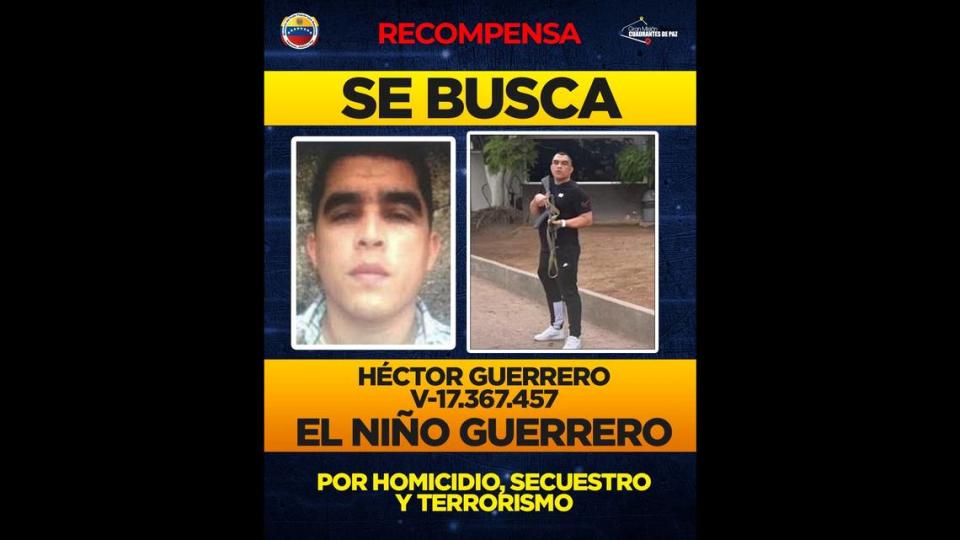Crime concerns grow as members of a violent Venezuelan gang arrive in American cities
As thousands of Venezuelans fleeing from the Nicolás Maduro regime seek refuge in the United States, members of a violent gang that has already triggered crime waves in a number of Latin American countries are hiding among them, causing concern among U.S. officials fearing that they now seek to set up shop in major American cities.
Rising from a Venezuelan prison and quickly expanding to become a sort of umbrella organization for other gangs, the so-called Tren de Aragua (Aragua Train) for years dominated crime in vast areas of the South American country, specializing in a long list of crimes ranging from extortion, car-theft and kidnapping to drug-trafficking, prostitution and murder for hire.
As an estimated 7.7 millions Venezuelans left their homes to migrate to other countries in the past 10 years, the gang saw in the exodus an opportunity to grow exponentially, increasing its ranks from the estimated 400 members in Venezuela to an army of more than 3,000 strong reportedly operating now in Colombia, Chile, Ecuador, Peru and Central America, in addition to their country of origin.
And now they are attempting to establish a beachhead in the United States, said Miami U.S. Rep. María Elvira Salazar.
The group “has been associated with a crime wave across Latin America. For example, there has been a 700% increase in kidnappings in Santiago de Chile associated with the presence of this gang. And this major crime threat has now arrived in the United States,” she said, adding that the beating of a police officer in New York City and two recent murders attributed to the gang are just “a taste of what’s to come if we don’t start getting serious about this threat.”
In a letter to President Biden, Salazar and other Republican lawmakers asked him to designate the gang as a Transnational Criminal Organization, arguing that the Tren de Aragua “is an invading criminal army from a prison in Venezuela that has spread their brutality and chaos to U.S. cities and small towns.”
“If left unchecked, they will unleash an unprecedented reign of terror, mirroring the devastation it has already inflicted in communities throughout Central and South America, most prominently in Colombia, Chile, Ecuador, and Peru. The breadth of Tren de Aragua’s operations encompasses murder, drug and human trafficking, sex crimes, extortion, and kidnapping, among other brutalities. It is clear that most state and local law enforcement agencies are not yet prepared to handle the magnitude of this grave threat,” the lawmakers wrote in the March 14 letter.
The designation would give the federal government the ability to impose sanctions on the mega-gang and its members, making it easier to freeze assets and restrict their travel and would also prompt U.S. federal agencies to prioritize the threat posed by the gang.
News reports of the arrival of Tren de Aragua in American cities is alarming members of the Venezuelan community living in the United States, who fear the gang will end up giving a bad name to all migrants from the South American country.
Patrica Andrade, an activist whose organization Venezuela Awareness Foundation has been helping migrants coming to South Florida for years, is quick to point out that gang members do not represent the character of Venezuelans coming into the U.S.
“The Venezuelan community, most of which has been rooted in the United States for many years, is made up of scientists, doctors, bankers, teachers, health care personnel and businessmen, who have made very important contributions to this nation,” she said in a recent statement.
“Because of this, we see with shock and sadness what is happening with some Venezuelans who have recently emigrated to the country and unfortunately have committed serious and atrocious criminal acts that we reject, because their behavior is not what characterizes the Venezuelan community,” she added.
Trouble in Times Square
Public awareness of the gang’s presence in New York was heightened earlier this year by a viral video showing alleged gang members beating up a couple of police officers in Times Square.
The officers, who were telling a group of immigrants gathering on West 42nd Street in Manhattan that they had to move on, were wrestled to the ground and severely kicked. Two of the suspects who were later arrested were identified as Tren de Aragua members, officials later told the New York Post.
The incident scandalized the city, but it is only one example of a series of run-ins between police and asylum seekers living in the streets of New York. According to local media reports, the city received more than 100,000 migrants since the spring of 2022, overwhelming local shelters and prompting a new wave of street crime that includes a sharp increase in pickpocketing and cell phone thefts.
Some of the arrests recently made in relation to the crime wave have been Venezuelan migrants. Although it has not been firmly established if those arrested have Tren de Aragua affiliations, the Venezuelan gang is often blamed by the local media for the heightened sense of lawlessness prevalent in the city.
That alleged gang members are preying on unsuspecting Times Square pedestrians has a simple explanation, said former senior DEA Special Agent Michael Brown, who has been monitoring gang activities in major American cities.
As newcomers to New York, a city that already has 24 active gangs, Tren de Aragua members are likely to have a difficult time in barging into the territories of other groups, he said. “They will not be in a position to launch an incursion into existing gang territory, therefore their source of revenue will have to be the general public through random robberies, assaults in the public space,” he said.
No Fear
And what most concerns U.S. officials is that members of South American gangs, such as the Tren de Aragua and El Salvador’s MS-13, are normally very young and have no fear of the police.
“They really hate the police and they are more than willing to aggressively attack and engage the police,” Brown, global director of counter-narcotics technology at Rigaku Analytical Devices, said.
Ivan Simonovis, a former police officer who served as the Venezuelan opposition’s commissioner for special security and intelligence, has been tracking the operations of the Tren de Aragua for some time and warns that its members have been quietly entering different areas of the U.S., including Florida, Chicago and New York.
“What they are doing now is setting up their networks, scouting the new environment and establishing their work structures, which was the way they entered Colombia, Chile and Peru. Once they identify the opportunities, they then move into recruiting people for their new operations,” he said.
While gang members normally shy away from public attention, Simonovis said he was not surprised by news of the beating of police officers in New York. “These are people that grew up in a country where there is very little respect for the law,” he said. “They don’t quite understand the concept of authority and normally are little inclined to obey instructions.”
Alleged murders
As shocking as the Times Square attack might have been to New Yorkers, a recent murder case in South Florida is the one that best illustrates the violence associated with the gang in Venezuela.
José Luis Sánchez Valera, a 43-year-old retired Venezuelan police officer who lived in Doral, was lured by women into a hotel room in Miami in late November and killed after he was abducted in the parking lot.
According to a Miami-Dade Police report, Sánchez left his home around 10 p.m. on Nov. 27 and went to La Quinta Inn Hotel and Suites, 3501 NW 42 Ave., to meet with a woman in one of the rooms. Four hours later, he left the hotel through a side exit to the parking lot and was abducted by three men upon entering his vehicle.
Hours later, two of the abductors went to the victim’s apartment and demanded jewelry from his roommate. He was told by the armed assailants that they belonged to the Tren de Aragua, according to the police report.
They left after being getting the contents of a small safe belonging to the retired police officer without hurting the roommate, but Sánchez’s body, hands and feet bound with tape, was later found inside his vehicle. The autopsy showed that the cause of death was mechanical asphyxia and the death was ruled a homicide.
Modus operandi
Cases like the Sanchez murder are common in Venezuela, where gang members often abduct victims suspected of having secret fortunes and torture them in order to gain access to the hidden wealth. Sometimes the victims are allowed to go free after the gangs take their money, given the low probability of their going for help to a local police force often seen as corrupt and in alliance with the gangs. But sometimes the gangs kill the victims to eliminate witnesses.
While the link to the gang is not as clear cut as in the Doral murder, the Feb. 22 killing of Laken Riley in Georgia is also being used to describe the threat posed by the gang. The Augusta University nursing student was killed by Venezuelan migrant José Antonio Ibarra, who had entered the U.S. illegally.
Riley, who had disappeared while jogging on the grounds of the University of Georgia, was found dead at Oconee Forest Park near Lake Herrick of blunt force trauma injuries. Ibarra was arrested and is believed to have acted alone, but his brother later grabbed the spotlight after local media reported that had tattoos on his neck of Tren de Aragua symbols.
Brown, the former DEA special agent, agrees that law enforcement officials, particular those overseeing the U.S.-Mexico border, need additional tools in order to check more effectively the background of the migrants coming in.
“We have literally thousands of potentially very dangerous gang members, or young men looking for gang associations, openly walking across the border. Some of them will seek a legitimate stay in the United States, but a large percentage is going to join the gangs because they represent an external fraternity for young men who don’t have anywhere to go,” he said.
“So if you have thousands of young people coming with no job, no opportunity, what are they going to do? They’re not going just to stand in line for welfare cards. They are going to join gangs and join that fraternity,” he added. “That is the danger America faces, especially in sanctuary cities.”


